2020年英语中考总复习21:中考重点句式二(含答案)
文档属性
| 名称 | 2020年英语中考总复习21:中考重点句式二(含答案) |
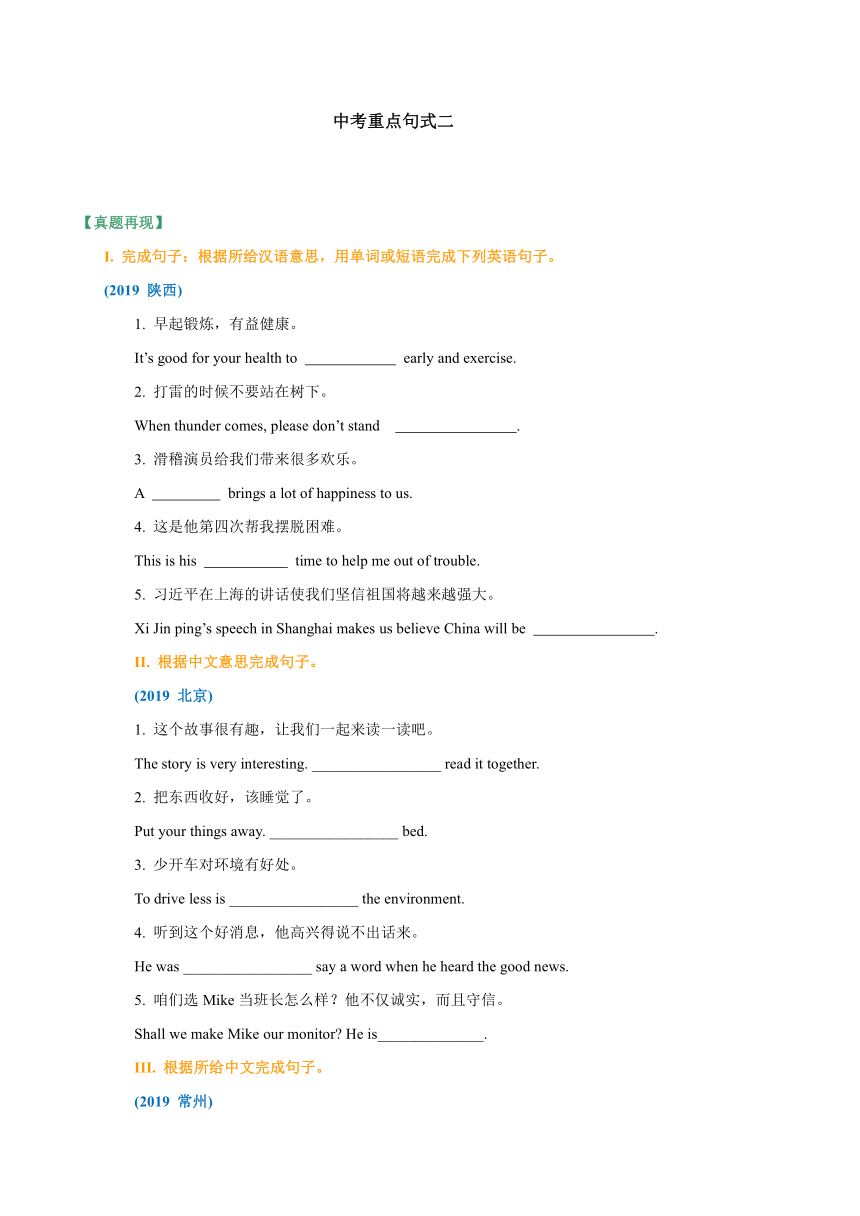
|
|
| 格式 | zip | ||
| 文件大小 | 38.8KB | ||
| 资源类型 | 教案 | ||
| 版本资源 | 人教新目标(Go for it)版 | ||
| 科目 | 英语 | ||
| 更新时间 | 2019-11-07 08:17:01 | ||
图片预览

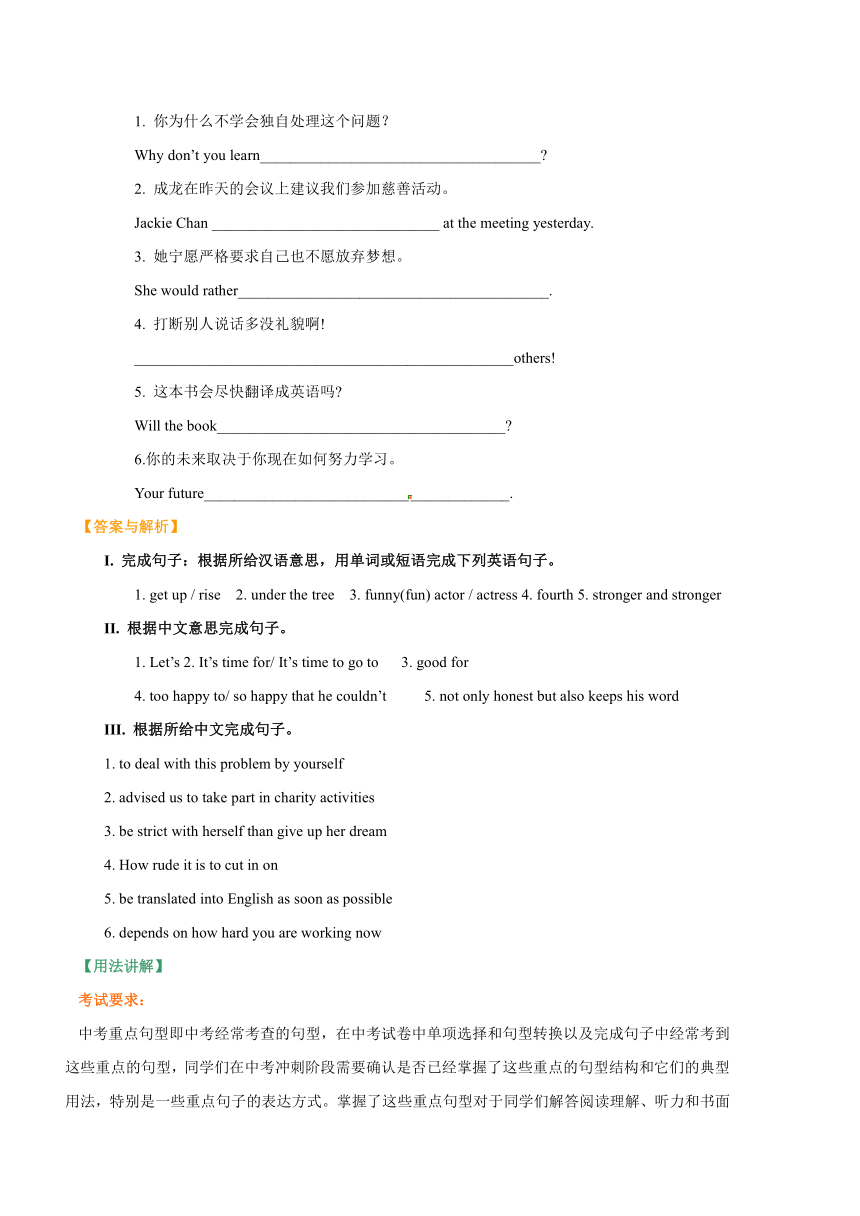
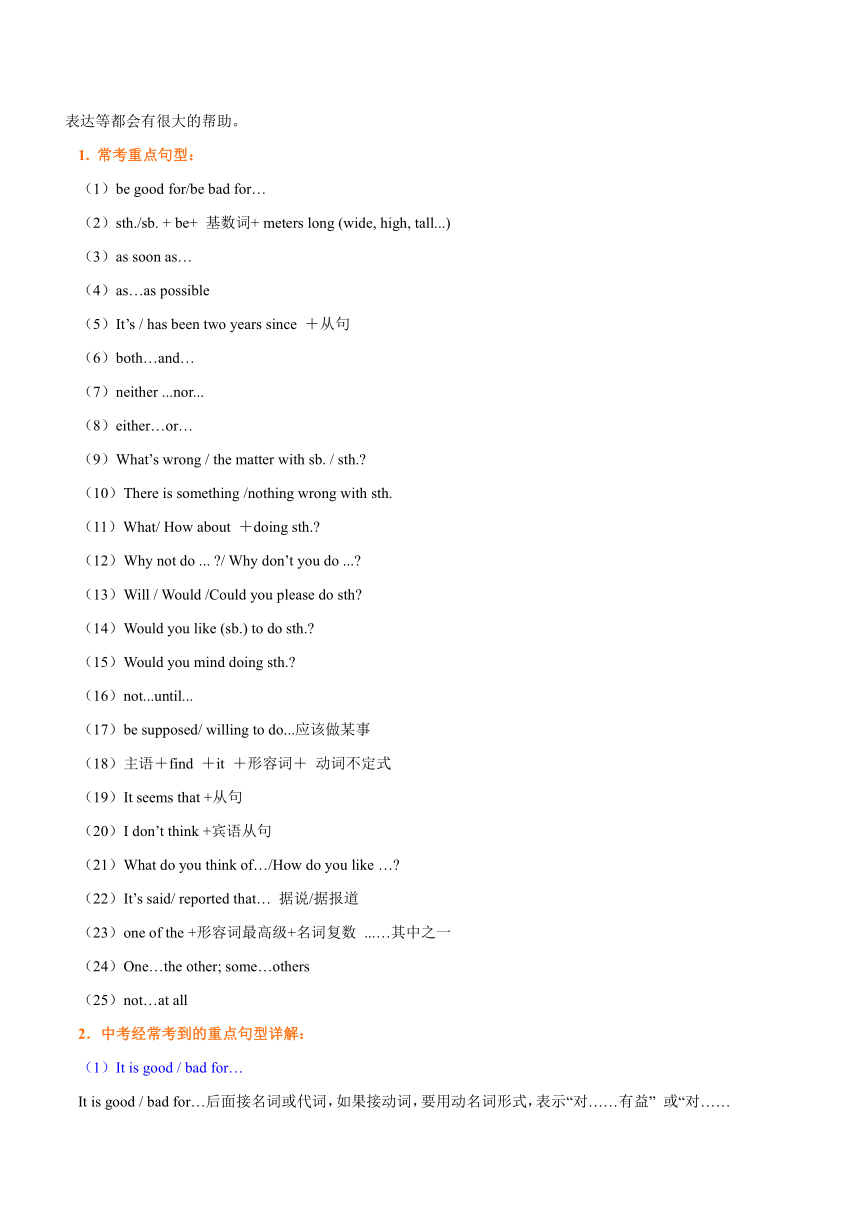
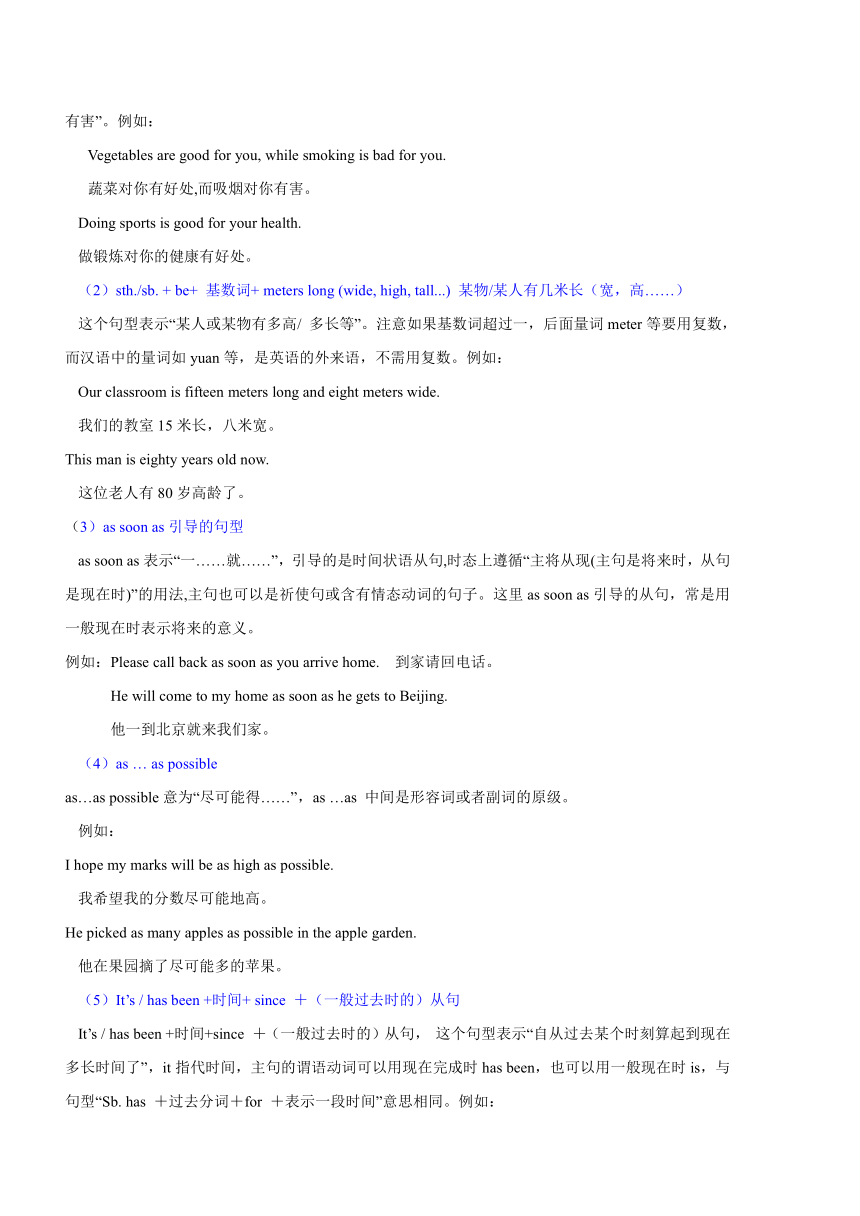
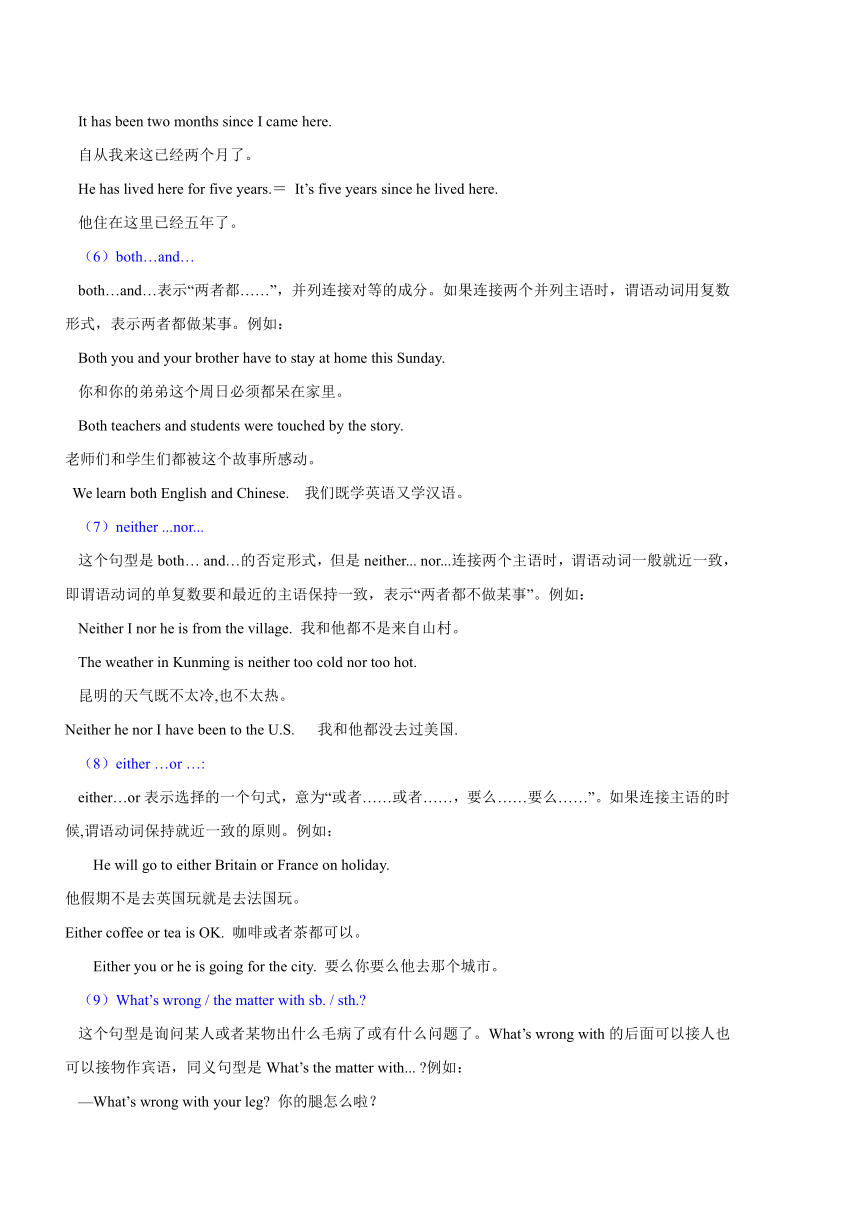
文档简介
中考重点句式二
【真题再现】
I. 完成句子:根据所给汉语意思,用单词或短语完成下列英语句子。
(2019 陕西)
1. 早起锻炼,有益健康。
It’s good for your health to early and exercise.
2. 打雷的时候不要站在树下。
When thunder comes, please don’t stand .
3. 滑稽演员给我们带来很多欢乐。
A brings a lot of happiness to us.
4. 这是他第四次帮我摆脱困难。
This is his time to help me out of trouble.
5. 习近平在上海的讲话使我们坚信祖国将越来越强大。
Xi Jin ping’s speech in Shanghai makes us believe China will be .
II. 根据中文意思完成句子。
(2019 北京)
1. 这个故事很有趣,让我们一起来读一读吧。
The story is very interesting. _________________ read it together.
2. 把东西收好,该睡觉了。
Put your things away. _________________ bed.
3. 少开车对环境有好处。
To drive less is _________________ the environment.
4. 听到这个好消息,他高兴得说不出话来。
He was _________________ say a word when he heard the good news.
5. 咱们选Mike当班长怎么样?他不仅诚实,而且守信。
Shall we make Mike our monitor? He is______________.
III. 根据所给中文完成句子。
(2019 常州)
1. 你为什么不学会独自处理这个问题?
Why don’t you learn_____________________________________?
2. 成龙在昨天的会议上建议我们参加慈善活动。
Jackie Chan ______________________________ at the meeting yesterday.
3. 她宁愿严格要求自己也不愿放弃梦想。
She would rather_________________________________________.
4. 打断别人说话多没礼貌啊!
__________________________________________________others!
5. 这本书会尽快翻译成英语吗?
Will the book______________________________________?
6.你的未来取决于你现在如何努力学习。
Your future___________________________/_____________.
【答案与解析】
I. 完成句子:根据所给汉语意思,用单词或短语完成下列英语句子。
1. get up / rise 2. under the tree 3. funny(fun) actor / actress 4. fourth 5. stronger and stronger
II. 根据中文意思完成句子。
1. Let’s 2. It’s time for/ It’s time to go to 3. good for
4. too happy to/ so happy that he couldn’t 5. not only honest but also keeps his word
III. 根据所给中文完成句子。
1. to deal with this problem by yourself
2. advised us to take part in charity activities
3. be strict with herself than give up her dream
4. How rude it is to cut in on
5. be translated into English as soon as possible
6. depends on how hard you are working now
【用法讲解】
考试要求:
中考重点句型即中考经常考查的句型,在中考试卷中单项选择和句型转换以及完成句子中经常考到这些重点的句型,同学们在中考冲刺阶段需要确认是否已经掌握了这些重点的句型结构和它们的典型用法,特别是一些重点句子的表达方式。掌握了这些重点句型对于同学们解答阅读理解、听力和书面表达等都会有很大的帮助。
1. 常考重点句型:
(1)be good for/be bad for…
(2)sth./sb. + be+ 基数词+ meters long (wide, high, tall...)
(3)as soon as…
(4)as…as possible
(5)It’s / has been two years since +从句
(6)both…and…
(7)neither ...nor...
(8)either…or…
(9)What’s wrong / the matter with sb. / sth.?
(10)There is something /nothing wrong with sth.
(11)What/ How about +doing sth.?
(12)Why not do ... ?/ Why don’t you do ...?
(13)Will / Would /Could you please do sth?
(14)Would you like (sb.) to do sth.?
(15)Would you mind doing sth.?
(16)not...until...
(17)be supposed/ willing to do...应该做某事
(18)主语+find +it +形容词+ 动词不定式
(19)It seems that +从句
(20)I don’t think +宾语从句
(21)What do you think of…/How do you like …?
(22)It’s said/ reported that… 据说/据报道
(23)one of the +形容词最高级+名词复数 ...…其中之一
(24)One…the other; some…others
(25)not…at all
2.中考经常考到的重点句型详解:
(1)It is good / bad for…
It is good / bad for…后面接名词或代词,如果接动词,要用动名词形式,表示“对……有益” 或“对……有害”。例如: Vegetables are good for you, while smoking is bad for you. 蔬菜对你有好处,而吸烟对你有害。
Doing sports is good for your health.
做锻炼对你的健康有好处。
(2)sth./sb. + be+ 基数词+ meters long (wide, high, tall...) 某物/某人有几米长(宽,高……)
这个句型表示“某人或某物有多高/ 多长等”。注意如果基数词超过一,后面量词meter等要用复数,而汉语中的量词如yuan等,是英语的外来语,不需用复数。例如:
Our classroom is fifteen meters long and eight meters wide.
我们的教室15米长,八米宽。 This man is eighty years old now.
这位老人有80岁高龄了。 (3)as soon as引导的句型
as soon as表示“一……就……”,引导的是时间状语从句,时态上遵循“主将从现(主句是将来时,从句是现在时)”的用法,主句也可以是祈使句或含有情态动词的句子。这里as soon as引导的从句,常是用一般现在时表示将来的意义。 例如:Please call back as soon as you arrive home. 到家请回电话。 He will come to my home as soon as he gets to Beijing. 他一到北京就来我们家。
(4)as … as possible as…as possible意为“尽可能得……”,as …as 中间是形容词或者副词的原级。
例如: I hope my marks will be as high as possible.
我希望我的分数尽可能地高。 He picked as many apples as possible in the apple garden.
他在果园摘了尽可能多的苹果。
(5)It’s / has been +时间+ since +(一般过去时的)从句
It’s / has been +时间+since +(一般过去时的)从句, 这个句型表示“自从过去某个时刻算起到现在多长时间了”,it指代时间,主句的谓语动词可以用现在完成时has been,也可以用一般现在时is,与句型“Sb. has +过去分词+for +表示一段时间”意思相同。例如:
It has been two months since I came here.
自从我来这已经两个月了。
He has lived here for five years.= It’s five years since he lived here.
他住在这里已经五年了。
(6)both…and…
both…and…表示“两者都……”,并列连接对等的成分。如果连接两个并列主语时,谓语动词用复数形式,表示两者都做某事。例如:
Both you and your brother have to stay at home this Sunday.
你和你的弟弟这个周日必须都呆在家里。
Both teachers and students were touched by the story. 老师们和学生们都被这个故事所感动。 We learn both English and Chinese. 我们既学英语又学汉语。
(7)neither ...nor...
这个句型是both… and…的否定形式,但是neither... nor...连接两个主语时,谓语动词一般就近一致,即谓语动词的单复数要和最近的主语保持一致,表示“两者都不做某事”。例如:
Neither I nor he is from the village. 我和他都不是来自山村。
The weather in Kunming is neither too cold nor too hot.
昆明的天气既不太冷,也不太热。 Neither he nor I have been to the U.S. 我和他都没去过美国.
(8)either …or …:
either…or表示选择的一个句式,意为“或者……或者……,要么……要么……”。如果连接主语的时候,谓语动词保持就近一致的原则。例如:
He will go to either Britain or France on holiday. 他假期不是去英国玩就是去法国玩。 Either coffee or tea is OK. 咖啡或者茶都可以。
Either you or he is going for the city. 要么你要么他去那个城市。
(9)What’s wrong / the matter with sb. / sth.?
这个句型是询问某人或者某物出什么毛病了或有什么问题了。What’s wrong with的后面可以接人也可以接物作宾语,同义句型是What’s the matter with... ?例如:
—What’s wrong with your leg? 你的腿怎么啦?
—Nothing serious. 没有什么大毛病。
注意:
此句型作宾语从句时,不需改变语序。
He asked me what was the matter with me. 他问我怎么了。
(10)There is something wrong with sth/sb. 某物或某人出毛病了。
这个句型表示“某物或某人出毛病了”。一般疑问句:Is there anything wrong with sth./sb.?,否定句:There isn’t anything wrong with sth./sb.或There is nothing wrong with sth./sb.
例如:There is something wrong with my computer. 我的电脑出毛病了。
There is nothing wrong with your bike. 你的自行车没毛病。
(11)What/ How about +doing sth.?
这个句型用于询问“做某事怎么样/ 如何”,用来征求别人的意见。介词about后要接名词、代词或动名词作宾语。例如:
What about swimming after school? 放学后去游泳怎么样?
—I’d like to go swimming. 我想去游泳。
—How about you?你呢?
(12)Why not do ... ?/ Why don’t you do ...? 为什么不做……?
这个句型表示 “向别人提出建议或征求意见”。Why not后可以直接加动词原形,可以看成是Why don’t you do ...?的省略形式,例如:
Why don’t you go there with me? = Why not go there with me?
为什么不和我一起去那里?
(13)Will / Would /Could you (please) do sth? 请你做某事好吗?
本句型是用情态动词will、would或could引起,表示“请求别人做某事”,would和could没有过去的意义,只是使语气更委婉,其中please可省略。例如:
Would you please open the door for me? 请你为我打开门好吗?
Will you please pass me the ball?请你把球传过来好吗?
注意:此句型中谓语动词受情态动词will、would等影响要用原形。
(14)Would you like (sb.) to do sth.?
这个句型是表示“你想要/愿意(某人)做某事吗”,would like后要用动词不定式,用来征求意见。例如:
Would you like me to help your son?你愿意让我帮你的儿子吗?
Would you like to go swimming with me after school?
放学后你愿意和我一起去游泳吗?
(15)Would you mind doing sth.?
这个句型是表示“做某事你介意吗?” 动词mind的后面用动名词形式作宾语,用于征求意见。例如:
Would you mind opening the door? 打开门你介意吗?
Would you mind smoking here?在这抽烟,你介意吗?
(16)含有not...until...的句型
本句型意思是“直到……才……”。含有until或till引导的时间状语从句,如果主句的谓语动词是延续性动词,主句是肯定句或否定句都可以;但是如果主句的谓语动词是非延续性动词,主句只能是否定句。例如:
I didn’t go to bed until I finished my homework.. 我直到做完作业才去睡觉。
(“没有上床睡觉”这个状态一直延续到“完成作业“为止)
I didn’t know the truth until he told me. 直到他告诉我,我才知道事实真相。 We didn’t know each other until last August. 我们直到去年八月份才认识。
(17)be supposed/ willing to do...
be supposed to do表示“某人理应该做某事”,be willing to do表示“某人愿意、乐意做某事”。这两个句型都是be+形容词+to do构成。例如:
You are supposed to shake hands. 你们理应该握手。
Are you willing to help? 你愿意帮忙吗?
(18)主语+find +it +形容词+ 动词不定式
本句型是it作形式宾语,真正的宾语是后面的动词不定式。不定式做宾语时,如果有形容词或名词等宾语补足语,不定式要后置。例如:
We find it difficult to play soccer in our school. 我们发现在我们的学校踢足球是非常困难的。
He found it interesting to draw pictures. 他发现画画很有趣。
(19)It seems that…从句
强调根据一定的事实所得出的一种接近于实际情况的判断,可以说就是事实,可以转换成“名词或代词+ seem +动词不定式”的句型,其意不变。如果动词不定式为to be + 形容词时,to be往往省略。例如:
It seems that it is more difficult for women to get to the top of the company.
妇女似乎更难提升到公司的最高职位。
It seems that no one likes the film. = No one seems to like the film.
似乎没有人喜欢这个电影。
It seems that he is happy every day. = He seems (to be) happy every day.
他似乎每天都很高兴。
(20)I don’t think +宾语从句
主句谓语动词是表示“想、认为”等意义的动词时,如think, believe, imagine, suppose, expect, guess等,主句主语是第一人称,而且主句是一般现在时的时候,从句否定一般要转移到主句中。例如:
I don’t think he is right. 我认为他不对。 We don’t think we can learn math well without her help.
我们觉得没有她的帮助,我们不可能学好数学。
(21)What do you think of…/How do you like …?
本句型表示“你认为/你感觉……怎么样?”。 用于询问主语对某事物的观点和看法。例如:
—What do you think of our school? 你觉得我们的学校怎么样?
—It’s very modern. 很现代化。
How do you like China?=What do you think of China?
你觉得中国怎么样?
(22)It’s said/ reported that…
本句型表示“据说/据报道”的意思。that引导主语从句,表示所说的或所报道的内容。be said/ reported是被动语态,这个句型多用一般现在时。例如:
It’s said that the news is not true. 据说那个消息不是真的。
It is reported that 300 million people in China have eyesight trouble.
据报道,在中国3.0亿人视力有问题。
(23)one of the +形容词最高级+名词复数
one of the+形容词最高级+名词复数,表示“是最……之一”。
例如:
China is one of the biggest countries in the world.
中国是世界上最大的国家之一。
My mother is one of the busiest people in my family.
妈妈是我们家最忙的人之一。
(24)one…the other; some…(the) others
1)One…the other…表示“两个人或物中的一个和另一个”,此时的other作代词。例如:
He has two daughters. One is a nurse, the other is a worker.
他有两个女儿,一个是护士,另一个是工人。
2)Some…others…表示“许多种的一些和另一些”,others是other的复数形式,泛指“另外几个、其余的”。the others 指除去一些剩下所有的,而others是另一些,不能涵盖剩下的所有情况。例如:
Some of us like singing and dancing, others go in for sports.
我们一些人喜欢唱歌和跳舞,其余的从事体育活动。 Some agree with them, while the others disagree.
一些人同意他们的观点,其他人都反对。
(25)not…at all
not…at all 表示“一点也不……”,常用在否定句中,加强语气。not要与be动词或助动词连用。例如:We don’t speak English at all after class. 在课下我们根本不讲英语。 Though she made many mistakes, she doesn’t feel sorry at all.
尽管她犯了很多的错误,她一点都不惭愧。 注意:
Not at all.的用法如下: 1)用于回答感谢,意为“不用谢;不客气”。例如:
—Thank you very much.多谢你了。
—Not at a11.不客气。
2)用于回答带有感谢性质的客套话,意为“没什么”。例如:
—You are very kind.你真好。
—Not at all . 没什么。
3)用于回答道歉,意为“没关系”。例如:
—I’m sorry to keep you waiting.对不起,让你久等了。
—Oh,not at a11.I’ve been here only a few minutes.
哦,没关系,我也刚到几分钟。
4) 用来表示否定(是No的加强说法),意为“一点也不,完全不”。例如:
—Are you busy? 你忙吗?
—Not at a11.一点不忙。
中考重点句式二
【巩固练习】
I.单项选择。
1. Do you hear someone _______ in our classroom just now?
A. to sing B. sing C. singing D. sings
2. We think English is as _______ as math.
A. more difficult B. more important C. important D. easier
3. Many boys think Math is _______ than any other subject.
A. interesting B. easiest C. more difficult D. difficult
4. Chongqing is ______ city _____ all the cities in China.
A. big, in B. bigger, of C. biggest, in D. the biggest, of
5. Look at that tall tree. I think it may be _______.
A. twelve meters tall B. twelve meter long C. tall twelve meters D. tall twelve meter
6. _______ twenty years since we came here.
A. This is B. That’s C. It’s D. They have been
7. Both his father and he _____ playing computer games.
A. like B. likes C. is like D. are like
8. Neither my wife nor I _____ to the Summer Palace. We are planning to go there on May 1.
A. have been B. have gone C. has been D. has gone
9. — ______ with your mother? She looks tired.
—She is ill.
A. What’s B. How’s C. What’s wrong D. What’s matter
10. There _____ nothing wrong with your bike.
A. be B. is C. are D. am
11. —What are you going to do this Sunday?
—How about _____ with your father?
A. to fish B. fishing C. fishes D. fish
12. Why not _____ to school on foot today?
A. to go B. going C. go D. went
13. Let’s _____ the teacher for help.
A. asking B. ask C. to ask D. asks
14.-Will you ______ me the way to your home?
-Sure.
A. say B. tell C. to say D. telling
15. Would you mind ______ me that book?
A. to pass B. pass C. passing D. passes
16. We will climb the hill as soon as the rain _____.
A. stop B. stops C. will stop D. stopping
17. The kids didn’t start to fly kites in the playground ______ the rain stopped.
A. if B. whenever C. until D. when
18. We are not supposed ______ football on Sundays.
A. to play B. play C. playing D. plays
19. They find _____ interesting to play with these babies.
A. it B. that C. one D. them
20. It seems to me that he ________ everything.
A. know B. to know C. knowing D. has known
21. I _____ think you _____ speak English.
A. think ; can’t B. don’t ; can C. don’t; can’t D. think; aren’t
22. — ______ do you think of my handwriting?
— I think it is very great.
A. How B. Why C. When D. What
23. —________ is your exam ______?
—It’s not too bad.
A. What; like B. How; like C. Why; like D. What ; be
24. It_____ that your car was stolen by your friend.
A. says B. is saying C. said D. is said
25. My brother is one of the ______ in his class.
A. tallest student B. best students C. tall student D. tall students
II.根据汉语提示完成句子。(模拟题)
北京丰台区 1. 我认为他不会来了。 I ______________________________ he will come. 2. 直到雨停了,同学们才回家。 The students _____________________________ the rain stopped. 3. 多吃蔬菜有好处。 ______________________________ eat more vegetables. 4. 当你遇到困难时,为什么不请求帮助呢? ____________________________ some help when you are in trouble? 5. 他每天要玩多长时间电子游戏? _____________________________________ computer games every day?
北京石景山区 1. 学好英语很有用。 ______________________________________ English well. 2. 请你一到学校就把书还我好吗? Will you return me the book _______________________________________? 3. 直到为考试做好了准备,李雷才休息。 Li Lei _______________________________________ he got ready for the exam. 4. 他们将花十年的时间把山变绿。 It ____________________________________ to make the mountains covered with trees. 5. 她变化太大了,以至于我没能立刻想起她的名字。 She changed ____________________________________ her name at once.
III.根据中文提示,补全句子,使其完整与正确。
1.中国农民正在尽最大的努力种植更多的树来阻止沙漠蔓延。
Chinese farmers are ________ best to plant more trees to stop the desert from expanding.
2.到目前为止,中国政府已为人们的医疗健康花费了大量的钱。
So ________,Chinese government has already ________ a lot of money on people’s health care.
3.因为腿疼,他不再去徒步了。
He doesn’t go hiking ________ ________ because of the pain in his leg.
4.你学习越努力,你就越会得到更好的结果。
The ________ you work at your lessons,the ________ results you will get.
5.每个中学生都应该为自己感到自豪,因为每个人都有优点。
Every middle school student is supposed to _______ _______ in themselves because each of them has good points.
6.今天天气很好。为什么不出去散散步?
It’s fine today. ____________ go out for a walk?
7.该考虑一下我们的暑假计划了。
_________ to think about our plan for the summer vacation.
8.北京以其众多的名胜古迹而闻名于世。
Beijing _________ its many places of interest in the world.
9.在体育测试中,我尽力了。
__________ possible in the PE test.
10.你最好不要过分依赖父母,学会照顾自己。
__________ your parents, and learn to look after yourself.
【答案与解析】
I.单项选择。
1. C。在hear somebody的后面用现在分词形式作宾语补足语,表示听到某人正在做某事,所以本题选择C。
2. C。本题是考查形容词的同级比较,as和as的中间用形容词的原级,所以选择C。
3. C。本题是考查形容词的比较级的用法,句子是把数学作为一方,其他所有学科为另一方进行比较,要用比较级,difficult的比较级是more difficult,所以选C。
4. D。本题是考查形容词的最高级的用法,形容词的最高级前面用定冠词the,Chongqing是all the cities中的一个,是同类关系,所以选D。
5. A。本题是考查表示某物多高的表达方式,即用数词+meters+tall来表示,所以选A。
6. C。句意:我们来到这里已经20年了。用it表示时间,此句型主句可以用一般现在时代替现在完成时,所以选C。
7. A。本题是考查both… and…的用法,both… and…连接两个主语,其谓语动词用复数形式,所以选择A。
8. A。从第二句可知没有去过颐和园,所以用have been to;neither... nor...连接主语,谓语动词和nor后面的主语保持一致,所以选A。
9. C。从对话的情景可以理解要用What’s wrong来询问“某人怎么啦”,所以选C。选项D的matter前缺少定冠词the。
10. B。不定代词nothing作主语谓语动词用第三人称单数,所以选B。
11. B。本题是考查what/how about的后面用动名词形式作宾语表示“做某事如何”的意思,所以选B。
12. C。本题是考查why not+动词原形的用法,用于向别人提出建议。后面用动词原形,所以选择C。
13. B。在动词短语let somebody do something用动词原形作宾语补足语,所以选B。
14. B。本题考查用情态动词will/would表示“请求别人做某事”的意思。句子的谓语动词用动词原形,tell可以接双宾语,所以选择B。
15. C。在动词短语would you mind的后面用动名词形式作宾语,所以本题选择C。
16. B。本题是考查as soon as引导的时间状语从句的用法,从句的谓语动词用一般现在时表示将来,所以选B。
17. C。本题是考查连词not... until...的用法,表示“直到……才……”,所以选C。句意:直到雨停了孩子们才开始放风筝。
18. A。be supposed 的后面用动词不定式,be supposed to do…意为“理应该做某事”。
19. A。本题是用it作find的形式宾语,真正的宾语是后面的动词不定式短语to play with these babies,所以选A。
20. D。在句型It seems that的后面要接从句,从句的时态根据句子的意思判断是现在完成时,所以选D。
21. B。本题是考查I don’t think+从句的用法,从句的否定要转移到前面的主句,所以选B。
22. D。本题是考查用特殊疑问词what和think of连用表示“你感觉……怎么样”的意思,所以选择D。
23. A。本题考查“询问某人或者某物怎么样”,be like意为“像什么样”。所以选A。
24. D。本题是考查用It’s said that +从句表示“据说”的意思,所以选择D。
25. B。one of the best students表示“是最好的学生之一”的意思,所以选B。
II.根据汉语提示完成句子。
丰台区
1. don’t think 2. didn’t go home until
3. It’s good to 4. Why not ask for
5. How long does it take him to play
石景山区
1. It’s very useful to learn
2. as soon as you get to school
3. didn’t have a rest until
4. will take them 10 years
5. so much that I couldn’t remember
III.根据中文提示,补全句子,使其完整与正确。
1.trying/doing their
2.far,spent
3.any more / any longer
4.harder,better
5.take pride
6.Why not
7.It’s time
8.is famous for
9.I tried as hard as
10.You’d better not depend too much on
【真题再现】
I. 完成句子:根据所给汉语意思,用单词或短语完成下列英语句子。
(2019 陕西)
1. 早起锻炼,有益健康。
It’s good for your health to early and exercise.
2. 打雷的时候不要站在树下。
When thunder comes, please don’t stand .
3. 滑稽演员给我们带来很多欢乐。
A brings a lot of happiness to us.
4. 这是他第四次帮我摆脱困难。
This is his time to help me out of trouble.
5. 习近平在上海的讲话使我们坚信祖国将越来越强大。
Xi Jin ping’s speech in Shanghai makes us believe China will be .
II. 根据中文意思完成句子。
(2019 北京)
1. 这个故事很有趣,让我们一起来读一读吧。
The story is very interesting. _________________ read it together.
2. 把东西收好,该睡觉了。
Put your things away. _________________ bed.
3. 少开车对环境有好处。
To drive less is _________________ the environment.
4. 听到这个好消息,他高兴得说不出话来。
He was _________________ say a word when he heard the good news.
5. 咱们选Mike当班长怎么样?他不仅诚实,而且守信。
Shall we make Mike our monitor? He is______________.
III. 根据所给中文完成句子。
(2019 常州)
1. 你为什么不学会独自处理这个问题?
Why don’t you learn_____________________________________?
2. 成龙在昨天的会议上建议我们参加慈善活动。
Jackie Chan ______________________________ at the meeting yesterday.
3. 她宁愿严格要求自己也不愿放弃梦想。
She would rather_________________________________________.
4. 打断别人说话多没礼貌啊!
__________________________________________________others!
5. 这本书会尽快翻译成英语吗?
Will the book______________________________________?
6.你的未来取决于你现在如何努力学习。
Your future___________________________/_____________.
【答案与解析】
I. 完成句子:根据所给汉语意思,用单词或短语完成下列英语句子。
1. get up / rise 2. under the tree 3. funny(fun) actor / actress 4. fourth 5. stronger and stronger
II. 根据中文意思完成句子。
1. Let’s 2. It’s time for/ It’s time to go to 3. good for
4. too happy to/ so happy that he couldn’t 5. not only honest but also keeps his word
III. 根据所给中文完成句子。
1. to deal with this problem by yourself
2. advised us to take part in charity activities
3. be strict with herself than give up her dream
4. How rude it is to cut in on
5. be translated into English as soon as possible
6. depends on how hard you are working now
【用法讲解】
考试要求:
中考重点句型即中考经常考查的句型,在中考试卷中单项选择和句型转换以及完成句子中经常考到这些重点的句型,同学们在中考冲刺阶段需要确认是否已经掌握了这些重点的句型结构和它们的典型用法,特别是一些重点句子的表达方式。掌握了这些重点句型对于同学们解答阅读理解、听力和书面表达等都会有很大的帮助。
1. 常考重点句型:
(1)be good for/be bad for…
(2)sth./sb. + be+ 基数词+ meters long (wide, high, tall...)
(3)as soon as…
(4)as…as possible
(5)It’s / has been two years since +从句
(6)both…and…
(7)neither ...nor...
(8)either…or…
(9)What’s wrong / the matter with sb. / sth.?
(10)There is something /nothing wrong with sth.
(11)What/ How about +doing sth.?
(12)Why not do ... ?/ Why don’t you do ...?
(13)Will / Would /Could you please do sth?
(14)Would you like (sb.) to do sth.?
(15)Would you mind doing sth.?
(16)not...until...
(17)be supposed/ willing to do...应该做某事
(18)主语+find +it +形容词+ 动词不定式
(19)It seems that +从句
(20)I don’t think +宾语从句
(21)What do you think of…/How do you like …?
(22)It’s said/ reported that… 据说/据报道
(23)one of the +形容词最高级+名词复数 ...…其中之一
(24)One…the other; some…others
(25)not…at all
2.中考经常考到的重点句型详解:
(1)It is good / bad for…
It is good / bad for…后面接名词或代词,如果接动词,要用动名词形式,表示“对……有益” 或“对……有害”。例如: Vegetables are good for you, while smoking is bad for you. 蔬菜对你有好处,而吸烟对你有害。
Doing sports is good for your health.
做锻炼对你的健康有好处。
(2)sth./sb. + be+ 基数词+ meters long (wide, high, tall...) 某物/某人有几米长(宽,高……)
这个句型表示“某人或某物有多高/ 多长等”。注意如果基数词超过一,后面量词meter等要用复数,而汉语中的量词如yuan等,是英语的外来语,不需用复数。例如:
Our classroom is fifteen meters long and eight meters wide.
我们的教室15米长,八米宽。 This man is eighty years old now.
这位老人有80岁高龄了。 (3)as soon as引导的句型
as soon as表示“一……就……”,引导的是时间状语从句,时态上遵循“主将从现(主句是将来时,从句是现在时)”的用法,主句也可以是祈使句或含有情态动词的句子。这里as soon as引导的从句,常是用一般现在时表示将来的意义。 例如:Please call back as soon as you arrive home. 到家请回电话。 He will come to my home as soon as he gets to Beijing. 他一到北京就来我们家。
(4)as … as possible as…as possible意为“尽可能得……”,as …as 中间是形容词或者副词的原级。
例如: I hope my marks will be as high as possible.
我希望我的分数尽可能地高。 He picked as many apples as possible in the apple garden.
他在果园摘了尽可能多的苹果。
(5)It’s / has been +时间+ since +(一般过去时的)从句
It’s / has been +时间+since +(一般过去时的)从句, 这个句型表示“自从过去某个时刻算起到现在多长时间了”,it指代时间,主句的谓语动词可以用现在完成时has been,也可以用一般现在时is,与句型“Sb. has +过去分词+for +表示一段时间”意思相同。例如:
It has been two months since I came here.
自从我来这已经两个月了。
He has lived here for five years.= It’s five years since he lived here.
他住在这里已经五年了。
(6)both…and…
both…and…表示“两者都……”,并列连接对等的成分。如果连接两个并列主语时,谓语动词用复数形式,表示两者都做某事。例如:
Both you and your brother have to stay at home this Sunday.
你和你的弟弟这个周日必须都呆在家里。
Both teachers and students were touched by the story. 老师们和学生们都被这个故事所感动。 We learn both English and Chinese. 我们既学英语又学汉语。
(7)neither ...nor...
这个句型是both… and…的否定形式,但是neither... nor...连接两个主语时,谓语动词一般就近一致,即谓语动词的单复数要和最近的主语保持一致,表示“两者都不做某事”。例如:
Neither I nor he is from the village. 我和他都不是来自山村。
The weather in Kunming is neither too cold nor too hot.
昆明的天气既不太冷,也不太热。 Neither he nor I have been to the U.S. 我和他都没去过美国.
(8)either …or …:
either…or表示选择的一个句式,意为“或者……或者……,要么……要么……”。如果连接主语的时候,谓语动词保持就近一致的原则。例如:
He will go to either Britain or France on holiday. 他假期不是去英国玩就是去法国玩。 Either coffee or tea is OK. 咖啡或者茶都可以。
Either you or he is going for the city. 要么你要么他去那个城市。
(9)What’s wrong / the matter with sb. / sth.?
这个句型是询问某人或者某物出什么毛病了或有什么问题了。What’s wrong with的后面可以接人也可以接物作宾语,同义句型是What’s the matter with... ?例如:
—What’s wrong with your leg? 你的腿怎么啦?
—Nothing serious. 没有什么大毛病。
注意:
此句型作宾语从句时,不需改变语序。
He asked me what was the matter with me. 他问我怎么了。
(10)There is something wrong with sth/sb. 某物或某人出毛病了。
这个句型表示“某物或某人出毛病了”。一般疑问句:Is there anything wrong with sth./sb.?,否定句:There isn’t anything wrong with sth./sb.或There is nothing wrong with sth./sb.
例如:There is something wrong with my computer. 我的电脑出毛病了。
There is nothing wrong with your bike. 你的自行车没毛病。
(11)What/ How about +doing sth.?
这个句型用于询问“做某事怎么样/ 如何”,用来征求别人的意见。介词about后要接名词、代词或动名词作宾语。例如:
What about swimming after school? 放学后去游泳怎么样?
—I’d like to go swimming. 我想去游泳。
—How about you?你呢?
(12)Why not do ... ?/ Why don’t you do ...? 为什么不做……?
这个句型表示 “向别人提出建议或征求意见”。Why not后可以直接加动词原形,可以看成是Why don’t you do ...?的省略形式,例如:
Why don’t you go there with me? = Why not go there with me?
为什么不和我一起去那里?
(13)Will / Would /Could you (please) do sth? 请你做某事好吗?
本句型是用情态动词will、would或could引起,表示“请求别人做某事”,would和could没有过去的意义,只是使语气更委婉,其中please可省略。例如:
Would you please open the door for me? 请你为我打开门好吗?
Will you please pass me the ball?请你把球传过来好吗?
注意:此句型中谓语动词受情态动词will、would等影响要用原形。
(14)Would you like (sb.) to do sth.?
这个句型是表示“你想要/愿意(某人)做某事吗”,would like后要用动词不定式,用来征求意见。例如:
Would you like me to help your son?你愿意让我帮你的儿子吗?
Would you like to go swimming with me after school?
放学后你愿意和我一起去游泳吗?
(15)Would you mind doing sth.?
这个句型是表示“做某事你介意吗?” 动词mind的后面用动名词形式作宾语,用于征求意见。例如:
Would you mind opening the door? 打开门你介意吗?
Would you mind smoking here?在这抽烟,你介意吗?
(16)含有not...until...的句型
本句型意思是“直到……才……”。含有until或till引导的时间状语从句,如果主句的谓语动词是延续性动词,主句是肯定句或否定句都可以;但是如果主句的谓语动词是非延续性动词,主句只能是否定句。例如:
I didn’t go to bed until I finished my homework.. 我直到做完作业才去睡觉。
(“没有上床睡觉”这个状态一直延续到“完成作业“为止)
I didn’t know the truth until he told me. 直到他告诉我,我才知道事实真相。 We didn’t know each other until last August. 我们直到去年八月份才认识。
(17)be supposed/ willing to do...
be supposed to do表示“某人理应该做某事”,be willing to do表示“某人愿意、乐意做某事”。这两个句型都是be+形容词+to do构成。例如:
You are supposed to shake hands. 你们理应该握手。
Are you willing to help? 你愿意帮忙吗?
(18)主语+find +it +形容词+ 动词不定式
本句型是it作形式宾语,真正的宾语是后面的动词不定式。不定式做宾语时,如果有形容词或名词等宾语补足语,不定式要后置。例如:
We find it difficult to play soccer in our school. 我们发现在我们的学校踢足球是非常困难的。
He found it interesting to draw pictures. 他发现画画很有趣。
(19)It seems that…从句
强调根据一定的事实所得出的一种接近于实际情况的判断,可以说就是事实,可以转换成“名词或代词+ seem +动词不定式”的句型,其意不变。如果动词不定式为to be + 形容词时,to be往往省略。例如:
It seems that it is more difficult for women to get to the top of the company.
妇女似乎更难提升到公司的最高职位。
It seems that no one likes the film. = No one seems to like the film.
似乎没有人喜欢这个电影。
It seems that he is happy every day. = He seems (to be) happy every day.
他似乎每天都很高兴。
(20)I don’t think +宾语从句
主句谓语动词是表示“想、认为”等意义的动词时,如think, believe, imagine, suppose, expect, guess等,主句主语是第一人称,而且主句是一般现在时的时候,从句否定一般要转移到主句中。例如:
I don’t think he is right. 我认为他不对。 We don’t think we can learn math well without her help.
我们觉得没有她的帮助,我们不可能学好数学。
(21)What do you think of…/How do you like …?
本句型表示“你认为/你感觉……怎么样?”。 用于询问主语对某事物的观点和看法。例如:
—What do you think of our school? 你觉得我们的学校怎么样?
—It’s very modern. 很现代化。
How do you like China?=What do you think of China?
你觉得中国怎么样?
(22)It’s said/ reported that…
本句型表示“据说/据报道”的意思。that引导主语从句,表示所说的或所报道的内容。be said/ reported是被动语态,这个句型多用一般现在时。例如:
It’s said that the news is not true. 据说那个消息不是真的。
It is reported that 300 million people in China have eyesight trouble.
据报道,在中国3.0亿人视力有问题。
(23)one of the +形容词最高级+名词复数
one of the+形容词最高级+名词复数,表示“是最……之一”。
例如:
China is one of the biggest countries in the world.
中国是世界上最大的国家之一。
My mother is one of the busiest people in my family.
妈妈是我们家最忙的人之一。
(24)one…the other; some…(the) others
1)One…the other…表示“两个人或物中的一个和另一个”,此时的other作代词。例如:
He has two daughters. One is a nurse, the other is a worker.
他有两个女儿,一个是护士,另一个是工人。
2)Some…others…表示“许多种的一些和另一些”,others是other的复数形式,泛指“另外几个、其余的”。the others 指除去一些剩下所有的,而others是另一些,不能涵盖剩下的所有情况。例如:
Some of us like singing and dancing, others go in for sports.
我们一些人喜欢唱歌和跳舞,其余的从事体育活动。 Some agree with them, while the others disagree.
一些人同意他们的观点,其他人都反对。
(25)not…at all
not…at all 表示“一点也不……”,常用在否定句中,加强语气。not要与be动词或助动词连用。例如:We don’t speak English at all after class. 在课下我们根本不讲英语。 Though she made many mistakes, she doesn’t feel sorry at all.
尽管她犯了很多的错误,她一点都不惭愧。 注意:
Not at all.的用法如下: 1)用于回答感谢,意为“不用谢;不客气”。例如:
—Thank you very much.多谢你了。
—Not at a11.不客气。
2)用于回答带有感谢性质的客套话,意为“没什么”。例如:
—You are very kind.你真好。
—Not at all . 没什么。
3)用于回答道歉,意为“没关系”。例如:
—I’m sorry to keep you waiting.对不起,让你久等了。
—Oh,not at a11.I’ve been here only a few minutes.
哦,没关系,我也刚到几分钟。
4) 用来表示否定(是No的加强说法),意为“一点也不,完全不”。例如:
—Are you busy? 你忙吗?
—Not at a11.一点不忙。
中考重点句式二
【巩固练习】
I.单项选择。
1. Do you hear someone _______ in our classroom just now?
A. to sing B. sing C. singing D. sings
2. We think English is as _______ as math.
A. more difficult B. more important C. important D. easier
3. Many boys think Math is _______ than any other subject.
A. interesting B. easiest C. more difficult D. difficult
4. Chongqing is ______ city _____ all the cities in China.
A. big, in B. bigger, of C. biggest, in D. the biggest, of
5. Look at that tall tree. I think it may be _______.
A. twelve meters tall B. twelve meter long C. tall twelve meters D. tall twelve meter
6. _______ twenty years since we came here.
A. This is B. That’s C. It’s D. They have been
7. Both his father and he _____ playing computer games.
A. like B. likes C. is like D. are like
8. Neither my wife nor I _____ to the Summer Palace. We are planning to go there on May 1.
A. have been B. have gone C. has been D. has gone
9. — ______ with your mother? She looks tired.
—She is ill.
A. What’s B. How’s C. What’s wrong D. What’s matter
10. There _____ nothing wrong with your bike.
A. be B. is C. are D. am
11. —What are you going to do this Sunday?
—How about _____ with your father?
A. to fish B. fishing C. fishes D. fish
12. Why not _____ to school on foot today?
A. to go B. going C. go D. went
13. Let’s _____ the teacher for help.
A. asking B. ask C. to ask D. asks
14.-Will you ______ me the way to your home?
-Sure.
A. say B. tell C. to say D. telling
15. Would you mind ______ me that book?
A. to pass B. pass C. passing D. passes
16. We will climb the hill as soon as the rain _____.
A. stop B. stops C. will stop D. stopping
17. The kids didn’t start to fly kites in the playground ______ the rain stopped.
A. if B. whenever C. until D. when
18. We are not supposed ______ football on Sundays.
A. to play B. play C. playing D. plays
19. They find _____ interesting to play with these babies.
A. it B. that C. one D. them
20. It seems to me that he ________ everything.
A. know B. to know C. knowing D. has known
21. I _____ think you _____ speak English.
A. think ; can’t B. don’t ; can C. don’t; can’t D. think; aren’t
22. — ______ do you think of my handwriting?
— I think it is very great.
A. How B. Why C. When D. What
23. —________ is your exam ______?
—It’s not too bad.
A. What; like B. How; like C. Why; like D. What ; be
24. It_____ that your car was stolen by your friend.
A. says B. is saying C. said D. is said
25. My brother is one of the ______ in his class.
A. tallest student B. best students C. tall student D. tall students
II.根据汉语提示完成句子。(模拟题)
北京丰台区 1. 我认为他不会来了。 I ______________________________ he will come. 2. 直到雨停了,同学们才回家。 The students _____________________________ the rain stopped. 3. 多吃蔬菜有好处。 ______________________________ eat more vegetables. 4. 当你遇到困难时,为什么不请求帮助呢? ____________________________ some help when you are in trouble? 5. 他每天要玩多长时间电子游戏? _____________________________________ computer games every day?
北京石景山区 1. 学好英语很有用。 ______________________________________ English well. 2. 请你一到学校就把书还我好吗? Will you return me the book _______________________________________? 3. 直到为考试做好了准备,李雷才休息。 Li Lei _______________________________________ he got ready for the exam. 4. 他们将花十年的时间把山变绿。 It ____________________________________ to make the mountains covered with trees. 5. 她变化太大了,以至于我没能立刻想起她的名字。 She changed ____________________________________ her name at once.
III.根据中文提示,补全句子,使其完整与正确。
1.中国农民正在尽最大的努力种植更多的树来阻止沙漠蔓延。
Chinese farmers are ________ best to plant more trees to stop the desert from expanding.
2.到目前为止,中国政府已为人们的医疗健康花费了大量的钱。
So ________,Chinese government has already ________ a lot of money on people’s health care.
3.因为腿疼,他不再去徒步了。
He doesn’t go hiking ________ ________ because of the pain in his leg.
4.你学习越努力,你就越会得到更好的结果。
The ________ you work at your lessons,the ________ results you will get.
5.每个中学生都应该为自己感到自豪,因为每个人都有优点。
Every middle school student is supposed to _______ _______ in themselves because each of them has good points.
6.今天天气很好。为什么不出去散散步?
It’s fine today. ____________ go out for a walk?
7.该考虑一下我们的暑假计划了。
_________ to think about our plan for the summer vacation.
8.北京以其众多的名胜古迹而闻名于世。
Beijing _________ its many places of interest in the world.
9.在体育测试中,我尽力了。
__________ possible in the PE test.
10.你最好不要过分依赖父母,学会照顾自己。
__________ your parents, and learn to look after yourself.
【答案与解析】
I.单项选择。
1. C。在hear somebody的后面用现在分词形式作宾语补足语,表示听到某人正在做某事,所以本题选择C。
2. C。本题是考查形容词的同级比较,as和as的中间用形容词的原级,所以选择C。
3. C。本题是考查形容词的比较级的用法,句子是把数学作为一方,其他所有学科为另一方进行比较,要用比较级,difficult的比较级是more difficult,所以选C。
4. D。本题是考查形容词的最高级的用法,形容词的最高级前面用定冠词the,Chongqing是all the cities中的一个,是同类关系,所以选D。
5. A。本题是考查表示某物多高的表达方式,即用数词+meters+tall来表示,所以选A。
6. C。句意:我们来到这里已经20年了。用it表示时间,此句型主句可以用一般现在时代替现在完成时,所以选C。
7. A。本题是考查both… and…的用法,both… and…连接两个主语,其谓语动词用复数形式,所以选择A。
8. A。从第二句可知没有去过颐和园,所以用have been to;neither... nor...连接主语,谓语动词和nor后面的主语保持一致,所以选A。
9. C。从对话的情景可以理解要用What’s wrong来询问“某人怎么啦”,所以选C。选项D的matter前缺少定冠词the。
10. B。不定代词nothing作主语谓语动词用第三人称单数,所以选B。
11. B。本题是考查what/how about的后面用动名词形式作宾语表示“做某事如何”的意思,所以选B。
12. C。本题是考查why not+动词原形的用法,用于向别人提出建议。后面用动词原形,所以选择C。
13. B。在动词短语let somebody do something用动词原形作宾语补足语,所以选B。
14. B。本题考查用情态动词will/would表示“请求别人做某事”的意思。句子的谓语动词用动词原形,tell可以接双宾语,所以选择B。
15. C。在动词短语would you mind的后面用动名词形式作宾语,所以本题选择C。
16. B。本题是考查as soon as引导的时间状语从句的用法,从句的谓语动词用一般现在时表示将来,所以选B。
17. C。本题是考查连词not... until...的用法,表示“直到……才……”,所以选C。句意:直到雨停了孩子们才开始放风筝。
18. A。be supposed 的后面用动词不定式,be supposed to do…意为“理应该做某事”。
19. A。本题是用it作find的形式宾语,真正的宾语是后面的动词不定式短语to play with these babies,所以选A。
20. D。在句型It seems that的后面要接从句,从句的时态根据句子的意思判断是现在完成时,所以选D。
21. B。本题是考查I don’t think+从句的用法,从句的否定要转移到前面的主句,所以选B。
22. D。本题是考查用特殊疑问词what和think of连用表示“你感觉……怎么样”的意思,所以选择D。
23. A。本题考查“询问某人或者某物怎么样”,be like意为“像什么样”。所以选A。
24. D。本题是考查用It’s said that +从句表示“据说”的意思,所以选择D。
25. B。one of the best students表示“是最好的学生之一”的意思,所以选B。
II.根据汉语提示完成句子。
丰台区
1. don’t think 2. didn’t go home until
3. It’s good to 4. Why not ask for
5. How long does it take him to play
石景山区
1. It’s very useful to learn
2. as soon as you get to school
3. didn’t have a rest until
4. will take them 10 years
5. so much that I couldn’t remember
III.根据中文提示,补全句子,使其完整与正确。
1.trying/doing their
2.far,spent
3.any more / any longer
4.harder,better
5.take pride
6.Why not
7.It’s time
8.is famous for
9.I tried as hard as
10.You’d better not depend too much on
同课章节目录
- 词法
- 名词
- 动词和动词短语
- 动词语态
- 动词时态
- 助动词和情态动词
- 非谓语动词
- 冠词
- 代词
- 数词和量词
- 形容词副词及其比较等级
- 介词和介词短语
- 连词和感叹词
- 构词法
- 相似、相近词比较
- 句法
- 陈述句
- 一般疑问句和否定疑问句
- 特殊疑问句及选择疑问句
- 反意疑问句
- 存在句(There be句型)
- 宾语从句
- 定语从句
- 状语从句
- 主谓一致问题
- 简单句
- 并列句
- 复合句
- 主谓一致
- 主、表语从句
- 名词性从句
- 直接引语和间接引语
- 虚拟语气
- 感叹句
- 强调句
- 倒装句
- 祈使句
- 句子的成分
- 句子的分类
- 题型专区
- 单项选择部分
- 易错题
- 完形填空
- 阅读理解
- 词汇练习
- 听说训练
- 句型转换
- 补全对话
- 短文改错
- 翻译
- 书面表达
- 任务型阅读
- 语法填空
- 其他资料
